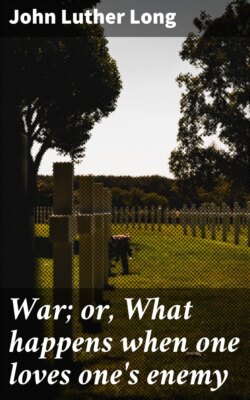Читать книгу War; or, What happens when one loves one's enemy - John Luther Long - Страница 6
На сайте Литреса книга снята с продажи.
Оглавление
IV
Table of Contents
IN LINCOLN'S PEN
AND about this time those mysterious doings began which, I suppose, always happen on the border between two nations at war. I can't tell, now, just what they were at first, but it made you creepy—and look suddenly behind you. Strange people came to the house, now and then, and asked strange questions. Queer teams passed along, with queer loads—often covered over with other things. Something got into the air which kept us nervous. I would come across a neighbor who had been peaceful and friendly the day before, to find him fighty and an enemy, ready to slam me in the face, and more ready to call me all sorts of hard names, and blaming me for the whole war.
In church, which was called "The Ark of Peace," it got so bad that the seats on the south side of the aisle was called "Africa" by the Unions, and the north side was called "Lincoln's Pen," by the secessionists. And the members moved from one side to the other, according to their war-politics.
The aisle was called "Kentucky" because it was supposed to be neutral territory. But no secessionist would move an inch to let a Union pass to "Lincoln's Pen" through "Kentucky". For, at that time, after the fourth fight at the store, the secessionists had far the best of it, and, according to my own count, there were three hundred and ten in "Africa," while "Lincoln's Pen" had only a hundred and forty-six. But that aisle made all take sides. There were no neutrals. There was nothing to sit on in "Kentucky."
Of course, Parr Horwitz had a hard time of it, preaching straight down that aisle, about angels and archangels all the time, avoiding everything fighty, till Herman Vare rose up in his pew in "Africa" one Sunday and said:
"Pastor, the Bible is full of war-stories. David and Goliath, the Battle of Jericho, the slaughter of the Amalekites, the crossing of the Red Sea, the battle of Armageddon—all of these typifying the present struggle of the South for liberty. We are two to one and we demand that you preach of wars and rumors of wars, two sermons out of three, or else—"
Well, "or else" meant that the pastor wouldn't get his salary the next month if he didn't—and, maybe, be wearing feathers instead of clothes—and he began, by preaching a hummer—calling upon the secessionists to blow their trumpets and throw down the abolition walls of Washington!
He got a cheer from "Africa"—the first cheers, I suppose, that old church ever heard—and afterward it was worse than ever—until "Africa" outnumbered "Lincoln's Pen" four to one, and the pastor kept on thundering war-sermons, never one about peace and doves, and not down the aisle, in "Kentucky"—where no one was—but straight into "Africa", with his back turned on "Lincoln's Pen".
I tell you it took courage to go to church, them days, and keep from fighting, and soon I excused myself—and so did most all of the other Unions. Four to one was no use.
After that they had it all their own way in "Africa"—and they didn't seem to like it. They were fighty, even in church, wanted to drive us to "Lincoln's Pen" to be bombarded. It wasn't much fun fighting battles without an enemy. They were too sure to win.
At last, when they hadn't us any more to fight, they got to fighting among themselves. Some was too secession and others wasn't secession enough. Some was ready to go into the Confederate army, and others said that was going too far. They got called cowards—spies—Abolitionists—and Know-Nothings—and they called the others Copperheads—Knights-of-the-Golden-Circle—and Nigger-lovers—and those were all fight-words to every man in those days. Well, the upshot of it was that they had a battle, right there in the church, and tore the place to pieces, with many wounded and no dead. Parr Horwitz was so scared that he skedaddled, and was never heard from again, and some one nailed up what was left of the church, and it wasn't opened again for five years. But that fight in the church made worse blood than anything else—like church fights always do. After that everybody was mad at everybody else, and called each other all kinds of hard names. And the secret organizations, for one disloyal purpose or another, flourished mightily—just for spite.
It never looked exactly like an Ark of Peace from that time on—the nice old church.
